|
March 15, 2018
ABI Liquidates Mediated Bargaining
Session
with Locked-Out Workers
No Room for Provocations and
a Hidden Agenda!
PDF

Locked out workers rally at Quebec National Assembly, February 8, 2018,
demanding Aluminerie
de Bécancour negotiate a settlement
ABI
Liquidates
Mediated
Bargaining
Session
with
Locked-Out Workers
• No Room for Provocations and a Hidden Agenda!
• Reject ABI's Secret and Self-Serving Agenda
and Hold the Global Cartel to Account - Pierre Chénier
Workers in Labrador
and Quebec Defend Their Rights
• Workers at Iron Ore Company of Canada Give
Strike Mandate Against
Anti-Worker Concessions
• Interview, Dany Maltais, United Steelworkers
Union Representative on
the Quebec North Shore
Nonsense About Tariffs
and Trade and Real Wars
• Is This Any Way to Manage an Economy? -
K.C.
Adams
ABI Liquidates Mediated Bargaining
Session with Locked-Out Workers
No Room for Provocations and a Hidden Agenda!

Rally at Quebec National Assembly, February 8, 2018.
On March 8, nearly two months after the start of the
lockout at the Aluminerie de Bécancour Inc. (ABI), the first
bargaining session between United Steelworkers Local 9700 and company
representatives lasted only a few minutes. In a blatant provocation,
ABI walked out of the talks refusing to engage in bargaining in good
faith even in the presence of a mediator.
A month earlier, the Quebec Minister of Labour, in
separate meetings with the union and company, suggested that
negotiations could begin with the assistance of a government appointed
mediator-conciliator. The union immediately agreed but ABI remained
silent until just before it abruptly liquidated the March 8 meeting,
grossly provoking and insulting the locked-out workers.
|

USW Local 9700 bargaining committee
speaks after ABI walked out of the
negotiating session.
|
According to USW Local 9700, the ABI bargaining
committee came to the table and immediately announced that it had no
mandate to negotiate anything and removed its previous "final offer"
from the table. Workers had rejected that offer on January 10,
while acknowledging elements in the offer could be used to negotiate an
agreement that would be acceptable to the workers.
Local union President Clément Masse described
the company's continuing refusal to negotiate as vengeful and
unproductive. Masse said, "This is a slap in the face to each and every
worker. After forcing us onto the street for two months, they are now
telling us that what they previously offered will not even be used as a
basis to seek a
settlement.
"They claim to want to hear suggestions from us, but
we're operating in a vacuum. It's unfortunate that representatives of
this employer don't have the decency to commit to a reasonable basic
standard expected in collective bargaining."
Masse added that the union negotiators entered into the
mediated bargaining session on March 8 confirming their
willingness to engage in meaningful discussions over the key stumbling
blocks -- pensions and seniority issues.
"Today we felt there was no desire from the employer to
negotiate in any meaningful way. They indicated vindictiveness for the
workers' rejection of their previous contract offer. It's the same
reaction we've had from them since they locked us out. They're losing
money due to their decision and they're trying to shift the blame onto
us,"
Masse said. “When the time comes that they are prepared to meaningfully
discuss resolutions to the outstanding issues, we’ll be pleased to work
with them in a productive way. Until then, the workers are standing
together, morale is good,” he added.
The company's continuing provocative behaviour
convinces workers that the owners of ABI, the Alcoa and Rio Tinto
monopolies, have a hidden agenda. The global cartel seeks to impose its
unspoken agenda at the expense of the living and working conditions of
the workers, the many elements within the local economy that depend on
ABI's
activities, and the entire surrounding population of
Mauricie-Centre-du-Québec.
The global aluminum sector is embroiled in
international intrigue amongst the big powers and cartels over control
and prices. The Alcoa-Rio Tinto cartel is seeking to strengthen its
control, force higher prices for finished aluminum and depress the
claims of workers who produce the finished product and those who supply
means of production
especially electricity and infrastructure.
The lockout at ABI, which is only one aluminum plant
among many that the global cartel controls, immediately reduces supply
thus putting upward pressure on the market price. The lockout is meant
to force concessions from workers and the Quebec government to depress
the value that workers claim from the aluminum they produce, the
price of hydroelectricity from Hydro-Quebec and inputs from local
suppliers.
The cartel's hidden agenda including its provocative
refusal to bargain represents a showdown with the workers, the local
community and the Quebec people and their society. Opposition to this
dictate requires the conscious organized resistance of the workers and
their allies so that a collective agreement acceptable to the workers
is signed as
soon as possible and the situation does not degenerate further.
Workers' Forum reiterates its full support
for ABI workers and calls on workers in Quebec and Canada to provide
them with all possible assistance. The global cartel's provocative
actions in using an important productive force as a weapon to tighten
its control over the direction of the Quebec and global economies are
not just a matter for the workers and community directly involved. The
cartel's actions are destructive to say the least and should not be
allowed to pass. Everyone should stand as one in opposition to the
Alcoa-Rio Tinto cartel and its hidden agenda to serve its narrow
private interests at the expense of the people.

Members of USW Local 8922, representing security guards, join USW Local
9700 for solidarity
rally outside the Bécancour plant, March 12, 2018. They pledge
ongoing financial assistance to
the locked-out workers.
For Your Information
The worldwide control of aluminum production by the
global monopolies means that the lockout reducing production in
Bécancour has already increased the commodity's market price.
Reports indicate that Alcoa and Rio Tinto are serving their North
American customers with now higher-priced aluminum their workers
produce in Europe. This criminal activity persists because the smelter
workers do not control their work, the smelter where they work and the
social product they produce. They cannot bring their social
responsibility and consciousness into play, which would ensure that a
proper price of production is paid for electricity, rights at the
workplace would be guaranteed, and the entire value smelter workers
produce would go in a planned way towards strengthening the economy in
their community and overall in Quebec and Canada, and to assist in
humanizing the social and natural environment.
The private interests who control Alcoa and Rio Tinto
are fixated on their own narrow interests in contradiction with the
whole. They could care less that the lockout harms the interests of
1,030 workers and their community. They could care less that
Hydro-Quebec does not receive the price of production for the
electricity the imperialist oligarchs buy, forcing other sectors of the
economy to make up the shortfall in value. The imperialists' obsession
with their own narrow private interests is incompatible with the
socialized economy in which their businesses operate. That is the root
cause of "market failures," recurring economic crises and unresolved
problems plaguing the economy and society. They are not concerned about
the negative ramifications of stealing electricity from Hydro-Quebec,
of locking out workers and destroying their pension plans and ripping
value out of the Quebec economy. They are wearing blinkers and do not
want to see what they do not care about beyond their narrow private
interests.

Reject ABI's Secret and Self-Serving Agenda and
Hold the Global Cartel to Account
- Pierre Chénier -
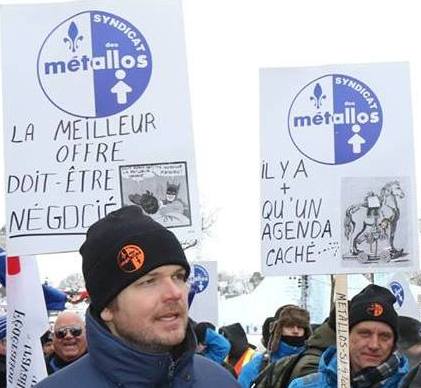
A press release issued by ABI following its provocative
liquidation of the March 8 government-mediated bargaining session
reveals some of Alcoa-Rio Tinto's hidden agenda.
ABI writes:
Representatives of the
Bécancour Smelter (ABI) management met with USW Local 9700
today, informing them that the plant needs fundamental changes to
achieve long-term success. The meeting took place in the presence of
Mr. Jean Nolin, the conciliator appointed by the Ministry of Labor.
The constant objectives of
ABI management during last year's long negotiations were to ensure the
sustainability of the plant and to reach a negotiated agreement.
However, the union's pressure tactics during these negotiations have
caused a significant deterioration of the operating conditions in the
plant, creating hazards for employees,
putting the products at risk, threatening the supply of customers and
negatively affecting the financial performance.
The union's rejection of a
fair and competitive offer left ABI management with no choice but to
take steps to protect its employees and the assets of the plant.
Consequently, the rejected offer can no longer serve as a basis for a
future settlement.
ABI is not as competitive as
it should be and this situation needs to be improved to succeed in the
long term.
As a result, ABI's
operational structure needs to be
re-evaluated with the goal of significantly improving productivity and
workforce organization to ensure consistency for its customers.
The
company's self-serving and deceptive diatribe against the workers
suggests it withdrew its previous "final offer" for two reasons:
1. "The plant needs fundamental changes to achieve
long-term success." The company must have the freedom to dictate these
changes without workers having a say or any control over their
direction regardless of the consequences.
2. The "union's pressure tactics during these
negotiations have caused a significant deterioration of the operating
conditions in the plant" to the point the company was forced to lock
out workers to "protect its employees and the assets of the plant" and
now even withdraw its final offer. Considering that the negotiations
and "union's
pressure tactics" (which are allegations they do not even bother to
describe) took place last year long before the March 8
meeting, it appears disingenuous at the very least to suggest the
workers and their tactics are the reason the company has withdrawn its
"rejected final offer" and refuses to negotiate a new contract.
The company considers negotiations in good faith to
reach terms of employment that defend the rights of workers as
"threatening" and something that should not happen, period. The global
cartel wants complete control to do whatever it wants and to depress
the claims of workers on the value they produce and the price of
hydroelectricity the
state enterprise supplies, otherwise the cartel threatens to destroy
the
plant.
 ABI wants a complete
restructuring of its operations on
its own terms and dictate, and is treating the workers or at least the
workers organized into a union as saboteurs of the production process.
This is a strange and completely outmoded view of the modern reality.
Workers are the producers of the wealth of ABI and have the right to
negotiate and have a decisive word on their working conditions. The
presence of cheap plentiful hydroelectricity was built through the
sweat and blood of Quebec workers in which billions of dollars of value
have been invested. The global cartel wants the living work-time of
smelter workers on its own terms and the congealed value of electricity
at below its price of production. This is not a modern or civilized
arrangement. ABI wants a complete
restructuring of its operations on
its own terms and dictate, and is treating the workers or at least the
workers organized into a union as saboteurs of the production process.
This is a strange and completely outmoded view of the modern reality.
Workers are the producers of the wealth of ABI and have the right to
negotiate and have a decisive word on their working conditions. The
presence of cheap plentiful hydroelectricity was built through the
sweat and blood of Quebec workers in which billions of dollars of value
have been invested. The global cartel wants the living work-time of
smelter workers on its own terms and the congealed value of electricity
at below its price of production. This is not a modern or civilized
arrangement.
The company uses the language of complete restructuring
to criminalize any opposition coming from those who do the work. The
characterization of the restructuring and the criminalization of
workers who demand a say and their rights have nothing to do with
negotiating a collective agreement. They are the words and actions of
dictators
who want to sabotage a civilized negotiation process. Such words,
actions and distortion of negotiations to arrange terms of employment
are most threatening for the workers, the community and Quebec, and
completely unacceptable.
ABI's words border on the absurd and would be laughable
if not dealing with such a serious situation. The same employees the
company wants to protect are those that it has locked out. This reminds
people of war propaganda such as when U.S. army officers during the
Vietnam War said they had to destroy the village to save it. Who are
the
villains against whom ABI wants to protect its employees? Its own
employees? Those who are united in the fight against the lockout and
demand their rights should be upheld? The workers organized into a
union? Does the cartel want to split the workers and pit workers
against one another, or even replace them altogether?
In any case, this is not a sign of willingness to
negotiate in good faith with the workers who produce the value that the
aluminum giants covet. If the word "negotiations" is to mean anything
at all, Alcoa-Rio Tinto must be held to account and brought to the
bargaining table. The right of workers to a say in
their working
conditions and collective terms of employment must be upheld in all
workplaces, regions and entire countries. They are not and should never
be the playground or theatre of war of the global private interests to
serve their narrow aim of maximum money profit and domination.

Workers in Labrador and Quebec Defend
Their Rights
Workers at Iron Ore Company of Canada Give
Strike Mandate Against Anti-Worker Concessions

Workers picket outside Iron Ore Canada plant in Labrador City during
2015 fight against
layoffs of maintenance workers at the plant.
Workers at the Iron Ore Company of Canada (IOC) in
Labrador City voted on March 5 and 6, to give their
negotiating committee a strike mandate to defeat the anti-worker
concessions demanded by the company. Ninety per cent of the 1,300
workers, members of Local 5795 of the United Steelworkers,
voted 99.6 per cent in favour of a strike mandate. The workers
will hold further meetings on March 20 and 21 to discuss the
negotiations. On March 23, they will be in a legal position to
take an actual strike vote.
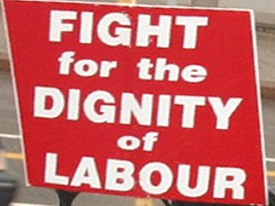 In Sept-Îles,
Quebec, 301 fellow IOC
workers, members of USW Local 9344, met on March 7
and 8, and gave their union committee a massive strike mandate
of 99.2 per cent with a participation rate of 88.3 per cent.
The Sept-Îles IOC workers are facing the same demands for
concessions in their terms
of employment. In Sept-Îles,
Quebec, 301 fellow IOC
workers, members of USW Local 9344, met on March 7
and 8, and gave their union committee a massive strike mandate
of 99.2 per cent with a participation rate of 88.3 per cent.
The Sept-Îles IOC workers are facing the same demands for
concessions in their terms
of employment.
Workers of the mining monopoly IOC generate enormous
value in the economy by mining iron ore, transforming it into use-value
in the form of pellets and concentrate, and transporting these products
to facilities where other workers can transform them further into
steel. The company expropriates the added-value, which workers produce,
as money profit for its global owners. The concessions the monopoly
demands are meant to increase its money profit, almost all of which is
not reinvested in the local communities but is taken out along with the
depleted natural resource. The concessions lessen the wages, benefits
and pensions of workers both now and into the future. Those claims on
the value workers produce form the bulk of the value from production
that stays in Labrador City and Sept-Îles.
Workers mine the iron ore in Labrador, which they then
concentrate and pelletize and prepare for transport by rail the 418
kilometres to the port of Sept-Îles for shipping to steel plants
worldwide. IOC is operated by Rio Tinto Ore Group and is a joint
venture among Rio Tinto (58.7 per cent), Mitsubishi Corporation (26.2
per cent) and Labrador Iron Ore Royalty Income Corporation (15.1 per
cent).

Interview, Dany Maltais, United Steelworkers Union
Representative on the Quebec North Shore

Workers at Iron Ore Canada in Sept-Iles, Quebec give union strong
strike mandate.
Workers' Forum:
Workers at the Iron Ore Company of Canada in Labrador and Sept-Iles in
Quebec recently gave strong strike mandates to their union executives
against IOC's demands for anti-worker concessions. Can you tell us more?
Dany Maltais: The vote was decisive. We
have 301 workers on our lists of active workers in
Sept-Îles. In three separate meetings, 266 workers took part
in the vote. This is a participation rate of 88 per cent. Of
the 266 people present, only two people voted against the strike
mandate. We are
very happy with the result.
In the negotiations, there are common monetary issues
negotiated at the same table for Sept-Îles and Labrador such as
wages, pensions and insurance. Among the demands for concessions, two
affect the pension plan. The first and most important one is that the
employer is asking for new workers to be put on a defined contribution
pension
plan rather than the defined benefit plan we have right now. For us
this is unacceptable. [A defined contribution plan] is much less
advantageous for workers, in particular because the amount workers
receive in retirement is not guaranteed. Also, to receive the defined
benefit plan, workers made concessions on wages in the
years 1990-2000.
It is inadmissible to try to introduce a disparity of
treatment of workers regarding the pension plan, to allow orphan
clauses [where new hires receive
inferior wages and benefits to current
workers -- WF note]. We do
not want to be the instigator of the
impoverishment of the North Shore population in the next 20
to 30 years.
We know that people have much less income in retirement, that they are
less healthy and require more care. Lowering incomes for retired
workers puts more of the tax burden on the citizens in general. There
is a regional issue in this negotiation. We do not want new people to
be impoverished. We are not a big community. We all know each
other. The mining industry has raised the standard of living of the
people of the North Shore, but if these workers start becoming
impoverished, governments put the tax burden for their expenses on the
community as a whole. We do not want to be the instigator of that.
Again with regard to the pension plan, IOC wants to
impose a new rule on the age at which workers can retire. Right now,
after 30 years of service, a worker can retire. The employer wants
to impose new terms so that even with 30 years of service, a
worker must have reached the age of 52 before retiring without
penalty.
This measure is organized to penalize young people, workers who often
start at the age of 18 or 19 and who reach 30 years of
service at 48 or 49 years old and will now have to work
longer. Our economy is not very diversified and there are young people
who take these jobs that pay well, like those at IOC,
Alouette or Arcelor Mittal, when they are very young and then work
there all their working life. Young people entering IOC will have to
give the employer more years before they retire if the company is
successful with this demand.
Then there is the demand for concessions on the issue
of extended vacations, another thing the employer wants to impose on
workers. Currently, as you accumulate seniority, you accumulate
vacation days that you can take in addition to your annual vacation.
The employer now wants workers to take these days in cash and forego
the extra
vacation. This is an unacceptable attack on the principle of seniority,
and also with the concern for work-family balance these days, is a step
backwards.
The fourth issue, which is a local one, deals with
technological change. The further we go, the more we hear about
automation of tasks. Two years ago, the employer started working out
programs based on the automation of our tasks. At the moment, the rule
is that workers affected by automation can take the jobs of workers
with less
seniority. Now the employer is telling us that there are tasks that we
will not be able to do because the jobs take engineers and technicians
and that we do not have the training to be able to work with the
computers and so on. So the employer wants to give these tasks to
supervisors and managers who will no longer be part of the bargaining
unit.
This means that progressively our union will be seriously weakened and
at risk. We will not have the mass of workers needed to build a balance
of power. In the long run, if this happens, it will not be unionized
workers who will operate the railway. The employer tells us not to
worry about it, that this is a long term issue, but we do not want to
go through this collective bargaining without discussing the issue. We
want a letter of understanding to be added to the collective agreement
that says that the new tasks that will be created based on automation
will have to be an integral part of the tasks that are performed by our
members. The employer tells us that they do not accept this demand
of ours.
WF: Would you like to say
something in conclusion?
DM: The employer must
withdraw these concessions. In this negotiation we are talking about
the future. We are talking about young people and we are talking about
the strength of our bargaining unit. We are taking up responsibility
and the local must make sure that we have a prosperous future. I am
proud of the work we
do for the entire community.

Nonsense About Tariffs and Trade and Real
Wars
Is This Any Way to Manage an Economy?
- K.C. Adams -
Working people could do better than
these constant
crises and
integration into the U.S. war economy
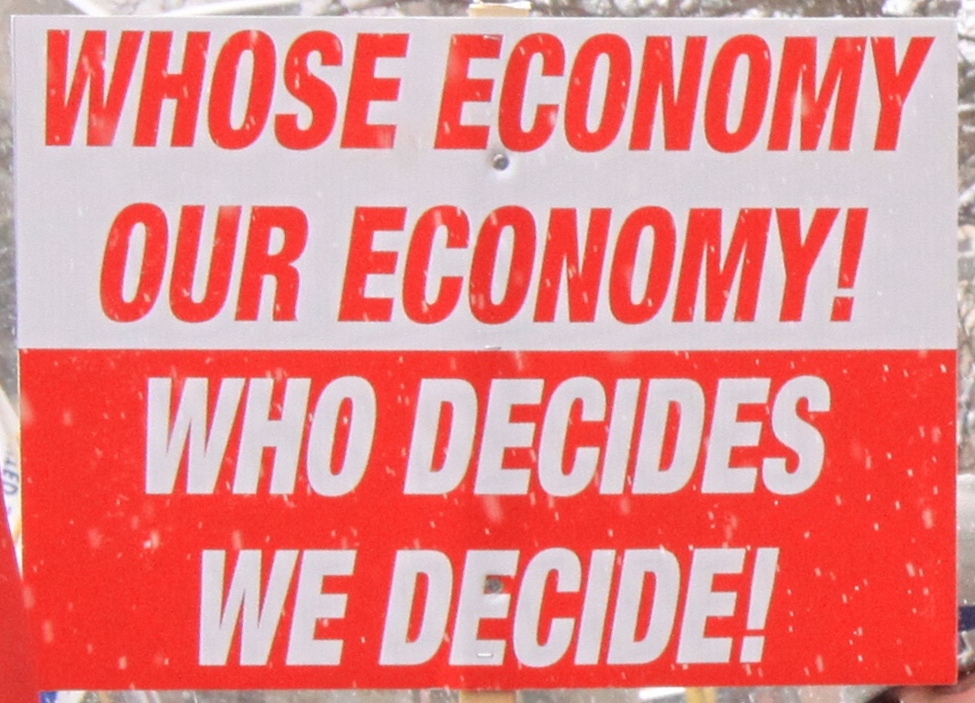
The Canadian steel and aluminum industries are in
turmoil.
They seem to be forever in chaos. Algoma Steel is almost always
in Companies' Creditors Arrangement
Act (CCAA) bankruptcy protection. The Aluminerie de
Bécancour Inc. (ABI) smelter in Quebec has locked out over one
thousand workers
for months demanding concessions from both workers and
Hydro-Quebec, and to reduce supply to force higher prices for
aluminum on the international market. Stelco steel plants in
Hamilton and Nanticoke have only recently emerged from CCAA
bankruptcy protection for the second time since 2006.
Having greatly reduced
Stelco's production capacity and
markets during the period of U.S. Steel control from 2007 to
2017, the new U.S. owners took control of the facilities last
year after having the CCAA
bankruptcy court allow them to ignore their social responsibility
to Stelco retirees and the necessary environmental remediation of
historical pollution. This new assault from foreign imperialists
occurred after Stelco steelworkers and the steel community had suffered
attack after attack under the control of U.S. Steel. In 2013, U.S.
Steel sold off a Stelco mill in Hamilton to German global brigands
calling themselves MANA, who seized control and almost immediately
locked out all steelworkers, demanding monstrous concessions. The
lockout continues to this day while members and supporters of USW Local
1005 pursue a battle for justice at MANA.
Nation-Building and Rights of the People Under Assault
Global monopolies dominate the steel and aluminum
sectors,
twisting and squeezing them to meet their narrow private
interests. The steel sector in particular is plagued with
fluctuating market prices widely disconnected both up and down
from prices of production, causing continuous problems. The
sectors do not serve an independent Canadian economy because that
is not the aim; nor does such a conception even exist in the
consciousness of the imperialists in control whose outlook is one
of self-interest, as if society does not exist and the rights,
claims and needs of the people are debilitating costs and a drain
on their money profit.

No nation-building project
for a Canadian economy not
dominated by supranational cartels is currently being discussed
in official circles of the ruling elite let alone struggling to
emerge in practice. All the official politicians, economists and
pundits say a Canadian economy under control by Canadians
themselves is not possible in this world dominated by global
empire-builders obsessed with expanding their own private
interests as supranational cartels in opposition to
nation-building and the right of the people to control those
affairs that affect their lives. Yet here the people are faced
with constant crises and a President down south who says, without
any concern for humanity, that trade wars and real wars are
winnable and good.
A disconnect appears between the real world Canadian
working
people face and some fanciful one that official politicians,
experts and those in control concoct. The aluminum sector,
entirely controlled by supranational empire-builders, has located
in Canada because of cheap and plentiful electricity, which is by
far the largest material input in the production process. So what
is the problem with the market price of aluminum that moves
President Trump to threaten a tariff? U.S. manufacturers,
especially those in the war economy, want aluminum at the lowest
price possible and Canadian aluminum suits that purpose because
of cheap, plentiful and clean hydro-electricity and a skilled
workforce and modern infrastructure.
If Trump wants aluminum at a higher price and U.S.
manufacturers that use aluminum are on board with his proposal,
which is highly doubtful, why not just say so and have the global
owners arrange a higher market price than the fluctuating market
price. The higher price could then go back to Hydro-Québec as
full exchange for the electricity its workers produce. Some view
it as ironic that the global rich who control Canada's aluminum
sector are already trying to force higher prices by reducing
supply with the lockout at ABI, so they obviously would be
overjoyed with Trump's demand for higher prices as long as it
flows back to them and not the U.S. state. Why does it have to
descend into a global trade war? The entire mess appears
inexplicable and irrational.
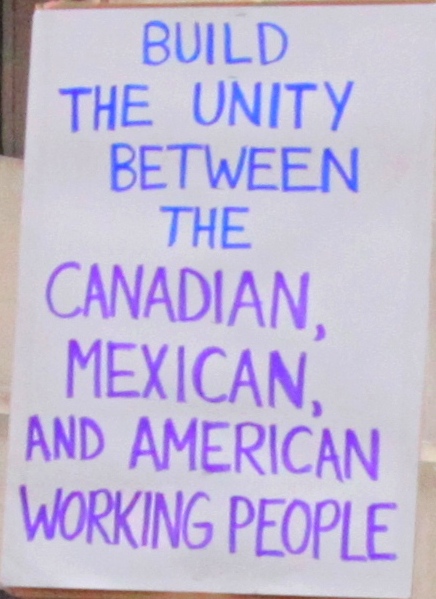 The problem with these and
other basic economic sectors is that sensible working people in Canada,
Mexico and the U.S., who want to live in peace and hold high a spirit
of international trade for mutual benefit and development and oppose
the war economy, are not in control of their workplaces, the broader
economy or political affairs. The problem with these and
other basic economic sectors is that sensible working people in Canada,
Mexico and the U.S., who want to live in peace and hold high a spirit
of international trade for mutual benefit and development and oppose
the war economy, are not in control of their workplaces, the broader
economy or political affairs.
The threat of steel tariffs that Trump made and now has
temporarily withdrawn is also bizarre in the sense that around
$5 billion worth of steel produced in Canada is shipped to the
U.S. while Canada imports about $7 billion worth of U.S.-made steel in
recent years. With some adjustments in quality and types of steel
this means almost all trade in steel between the U.S. and Canada
at this point could be eliminated with each country producing for
their own needs without any loss of production. Some
opportunities for development could even arise as Canada and the
U.S. are so broad east to west that production could be
rationally developed in all the main regions of each country to
make them self-reliant in steel and even broaden out into
manufacturing of steel-based goods. The other most positive
feature would be to begin to extricate Canada from the U.S. war
economy where both steel and aluminum are key.
Again the problem here is lack of control by working
people.
Canadian and neighbouring fellow workers down south face the
dilemma that they are not in control of the steel or aluminum
sectors, the broader economy and politics. The lack of control
means they cannot bring to the fore in practice their social
consciousness of the necessity to first have a diverse and
self-reliant internal economy, and from a sovereign base under
their control search and find peoples abroad who are willing to
trade following modern principles of mutual benefit and
development and are not bent on destructive trade wars and real
wars requiring a war economy.
Canadians and friends in the U.S. face the task of
bringing
into being a new direction for the economy because the situation
of gearing up for bigger and more devastating wars and crises is
not good to say the least. Working people can do better because
they begin neither from an aim of expropriating social wealth
from the value their fellow workers produce nor do they speculate
as those in power now do of waging "winnable" destructive trade
and real wars to steal from others and destroy what they cannot
control. The official anti-social talk saying trade and real wars
targeting fellow working people are good and winnable and require
a war economy puts everyone constantly on edge with their minds
overwhelmed anticipating the next crisis and war.
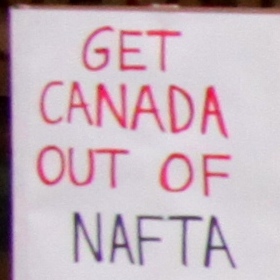 The official politicians and
other leaders in Canada
are
shameful in their response to Trump's bluster of first proposing
tariffs on Canadian steel and aluminum and then backing off if
NAFTA talks go his way. Canadian officials all stressed the
necessity to develop the joint North American war economy as
essential in strengthening the war capacity of NATO and NORAD for
which steel and aluminum are crucial. The official politicians and
other leaders in Canada
are
shameful in their response to Trump's bluster of first proposing
tariffs on Canadian steel and aluminum and then backing off if
NAFTA talks go his way. Canadian officials all stressed the
necessity to develop the joint North American war economy as
essential in strengthening the war capacity of NATO and NORAD for
which steel and aluminum are crucial.
Prime Minister Trudeau's Office on March 8 released a
statement of Trudeau's phone conversation with Paul Ryan, Speaker
of the U.S. House of Representatives, which said in part:
"The United States is Canada's closest ally. Canada is
a safe
and secure supplier of steel and aluminum to the U.S., recognized
under U.S. law as part of the U.S. defence industrial
complex."
In a release about Trudeau's conversation with Senate
Majority Leader Mitch McConnell, the PMO said in part:
As a close ally of the
United States, Canada is a safe
and
secure supplier of steel and aluminum to the United States and is
part of the United States National Technology and Industrial Base
related to National Defence.
Foreign Minister Chrystia Freeland said on March 1, "As
a key
NORAD and NATO ally, and as the number one customer of American
steel, Canada would view any trade restrictions on Canadian steel
and aluminum as absolutely unacceptable.... Canada is a safe and
secure supplier of steel and aluminum for U.S. defence and
security. Canada is recognized in U.S. law as a part of the U.S.
National Technology and Industrial Base related to national
defence."
Later on March 8 following Canada's exemption from the
global
U.S. tariff on steel and aluminum she said:
We are America's best friend
and closest ally. Canada
and
the United States have the greatest economic partnership of any
two countries in the world. We're staunch allies in NORAD, in
NATO, and all along our 8,891 km peaceful and secure border.
The crisis is such that no official Canadian leader or
mass
media has objected to this warmongering talk and
integration of the Canadian economy into the U.S. war economy.
Canadian, Mexican and U.S. working people reject the official
warmongering, anti-social view and outlook and are organizing to
gain the power to deprive those currently in control of their
power to destroy through crises and wars what humans have
built.
In organizing and fighting for the new, working people
and
their political and defence organizations are developing the
human factor and social consciousness that a modern economy must
have a new aim that strives to develop the socialized economy in
an all-sided manner without crises and war. A modern economy
cannot be built on brutal competition and war but on cooperation
where modern social relations ensure the interrelated sectors of
the socialized productive forces perform in conformity with each
other and their socialized nature for extended reproduction of
the economy without war and crises so that it can meet the needs
and claims of the actual producers and general interests of
society.
A modern economy opposes trade wars, real wars and
preparations for war. It strives to guarantee the well-being of
all members of society and its general interests. A pro-social
economy with such a sound internal foundation trades globally
based on the principles of mutual benefit and development,
consciously opposing all trade and real wars and preparations for
war. This is not the case now where the Canadian economy is
integrated into the U.S. war economy supplying both raw and
semi-finished material while the U.S. economy produces most of
the finished weapons of individual and mass destruction.
Working people with their modern social consciousness
can
take the economy in a new pro-social direction but to do so they
must organize to bring themselves into power politically with new
social relations in harmony with the socialized productive forces
of modern industrial mass production. Only with political
empowerment can working people make the leap to directing the
economy without crises and war according to their modern social
consciousness, aim, outlook, principles and social relations,
working together for the good of all humanity and the social and
natural environment.
Working People Can Do Better!
Unite and Organize to Build the New!

PREVIOUS
ISSUES | HOME
Website: www.cpcml.ca
Email: office@cpcml.ca
|

